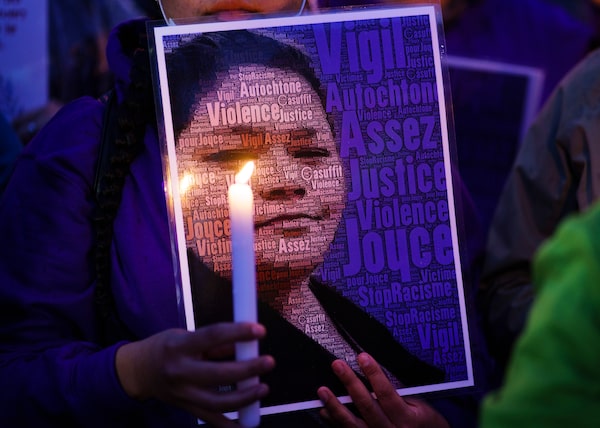
A picture of Joyce Echaquan is seen during a vigil in front of the hospital where she died in Joliette, Que. on Tuesday, September 29, 2020.Paul Chiasson/The Canadian Press
The federal government is being urged to establish national standards to ensure the delivery of health care does not discriminate against Indigenous people after a woman live-streamed her cries for help in a Quebec hospital and the abuse she endured before her death.
The seven-minute Facebook post this week showed Joyce Echaquan, a 37-year-old mother of seven from the Atikamekw nation of Manawan, screaming in pain in a Quebec hospital room. Her family said she had sought treatment for stomach pain.
The video of Ms. Echaquan’s last moments alive drew condemnation across the country on Wednesday, including from Prime Minister Justin Trudeau, who said Canadians were shocked to see what happened, calling it another example of systemic racism happening when someone needed help the most.
Experts on Indigenous people’s experiences in the health care system say the kind of treatment shown in the video is a Canada-wide problem.
Alika Lafontaine, an anesthesiologist and a past president of the Indigenous Physicians Association of Canada, said on Wednesday that what happened to Ms. Echaquan, while it is horrific, is common.
“If you talk to Indigenous patients, Black patients, persons of colour, or Indigenous physicians, Black physicians or persons of colour, you’ll probably hear from them in the way that you are hearing from me that it does not surprise me that this happened to Joyce," he said.
Such recordings can often seem as if they depict one of the first times an incident like this happened, but the reality is that a recording is never the first time, Dr. Lafontaine added.
Mary Ellen Turpel-Lafond, who is investigating allegations that emergency staff at a B.C. hospital played a game to guess blood-alcohol levels of Indigenous patients, said that while health care is a provincial responsibility, racist treatment in its delivery is a national issue.
She called on Ottawa to lay out national standards for health care.
The federal legislation for publicly funded health care insurance lays out the primary objective of health care policy as “to protect, promote and restore the physical and mental well-being of residents of Canada and to facilitate reasonable access to health services without financial or other barriers.”
Prof. Turpel-Lafonde, a professor at the University of British Columbia’s Peter Allard Hall School of Law, said the federal government could prescribe in the Canada Health Act that services must be delivered in a way that does not discriminate against Indigenous people and ensures their safety.
“The federal government is funding the system, the federal government has primary responsibility for First Nations people, and the federal government has ... a national health act under which all our services fall," she said.
NDP Leader Jagmeet Singh said on Wednesday that “systemic racism strips people of their dignity and kills them," adding that it should come to an end.
During the video Ms. Echaquan posted, at least two health care workers were in the room, including one who told her in French, “You’re stupid as hell.” Another woman said, "You made some bad choices, my dear. What are your children going to think, seeing you like this, eh?”
Quebec Premier François Legault said on Wednesday that the province’s anti-racism task force, led by two cabinet ministers, will make recommendations in the coming weeks to combat the type of situation that took place in the hospital in Joliette, about 70 kilometres northeast of Montreal.
“I was, like all Quebeckers, shocked to hear the video and hear the racist words that were spoken about Madame Echaquan,” Mr. Legault said. “We will fight against racism. It’s completely unacceptable what we saw there.”
The Quebec coroner’s office announced on Tuesday it will investigate the circumstances of Ms. Echaquan’s death, the local health board said it will conduct an internal probe, and a nurse has been fired over the incident.
In an interview with The Globe and Mail, Health Minister Patty Hajdu said on Wednesday that all too often, Indigenous and racialized people experience racism and discrimination that no one records.
“What she [Ms. Echaquan] has left behind is really, really important,” Ms. Hajdu said. “It bears witness to the others that go through this without anyone advocating for them."
Systemic racism in the health care system is a national problem, Ms. Hajdu said, adding that rapid action is needed.
“It would be premature for me to say what measures we could use to actually accelerate work to end systemic racism in the health care sector," she said. “The federal government is firmly committed to dealing with systemic racism.”
Nel Wieman, president of the Indigenous Physicians Association of Canada, said it is appalling that such incidents occur, and Canadians do not like to think of having racism in their country.
“We die at the hands of police, we die at the hands literally of health care workers. ... It is a country’s shame that this continues to happen."
Prof. Turpel-Lafond stressed the importance of elevating the response to the national level, adding that racism does not simply result in hurt feelings.
“This is at the moment of the most essential services that you need, in an emergency room, which is the interface between you, life and death," she said. "In that moment of need, the racism can shorten your life.”
With a report from Eric Andrew-Gee
Know what is happening in the halls of power with the day’s top political headlines and commentary as selected by Globe editors (subscribers only). Sign up today.